Table of Contents
Every year, nearly 805,000 people in America suffer from heart disease. It is one of the leading causes of death of people in the USA. However, thanks to the advancements in medical technology, these numbers are now reducing.
Though, it does not mean that you should be ignorant about any heart-related diseases. Heart diseases mainly include heart attack and coronary artery disease (CAD). The echo stress test is the one that makes the early diagnosis possible to get started with necessary treatment.
Although the echo stress test is a standard test and is often carried out at medical centers, there are chances that you may not have heard about it. In that case, it is understandable that you have certain doubts, questions, or even fears about the test.
To help you clear your doubts regarding this test and give you an overall idea about how it works, in this article, we will cover all the aspects of the echo stress test in a detailed yet easy-to-understand manner.
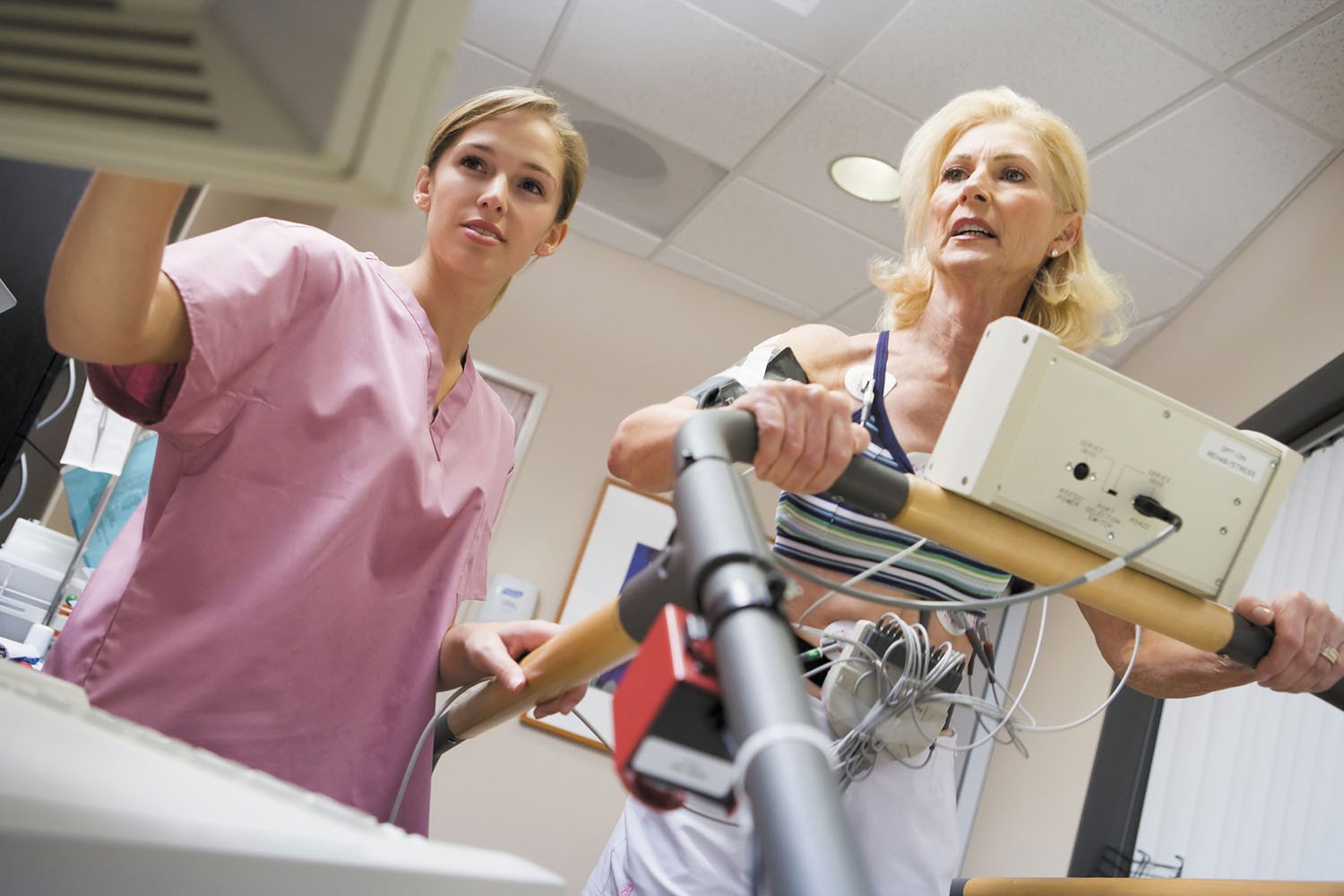
Overview | Echo Stress Test
As the name suggests, the echo stress test is performed to test how well heart muscles perform when put under physical stress. This test determines the health status of the heart, blood vessels, and their functioning.
The doctors might suggest you perform the test if you face chest pain or if there are symptoms of heart attack or coronary artery disease. Also, before any significant heart surgery, this test can help calculate risks and complications associated with the surgery.
There are some preparations and precautions which you will have to follow to get the test done most effectively. Consult with your doctor, and he will brief you about do’s and don’ts to be followed from 24 hours before your test.
After the preparations, the test can be done in two ways. Either through exercise on a treadmill or through drugs like dobutamine if exercising is not possible. Your echocardiogram will be taken while you rest and during exercise.
After monitoring your blood pressure, ECG, and echocardiogram images, the doctor will examine the results and will inform you if any further treatment is required or not.
A usual echo stress test should look like this. But if you want to know about this test in a detailed manner, follow this article till the end. Let’s first begin with understanding what an echo stress test really is.
What Is The Echo Stress Test?
The echo stress test is a noninvasive ultrasound test used to determine the pumping of your heart, evaluate the size of your heart condition of your heart valves, and check if blood flow from blood vessels is normal or not.
This test is usually called by various terms like stress echocardiogram or stress echo test. But there’s no need to get confused as all of these terms mean the same.
During the test, the doctor will note down the parameters of your heart using various instruments like a transponder, ECG tools, etc. First, the readings will be noted when you are at rest and then one more time when you will be asked to exercise on the treadmill.
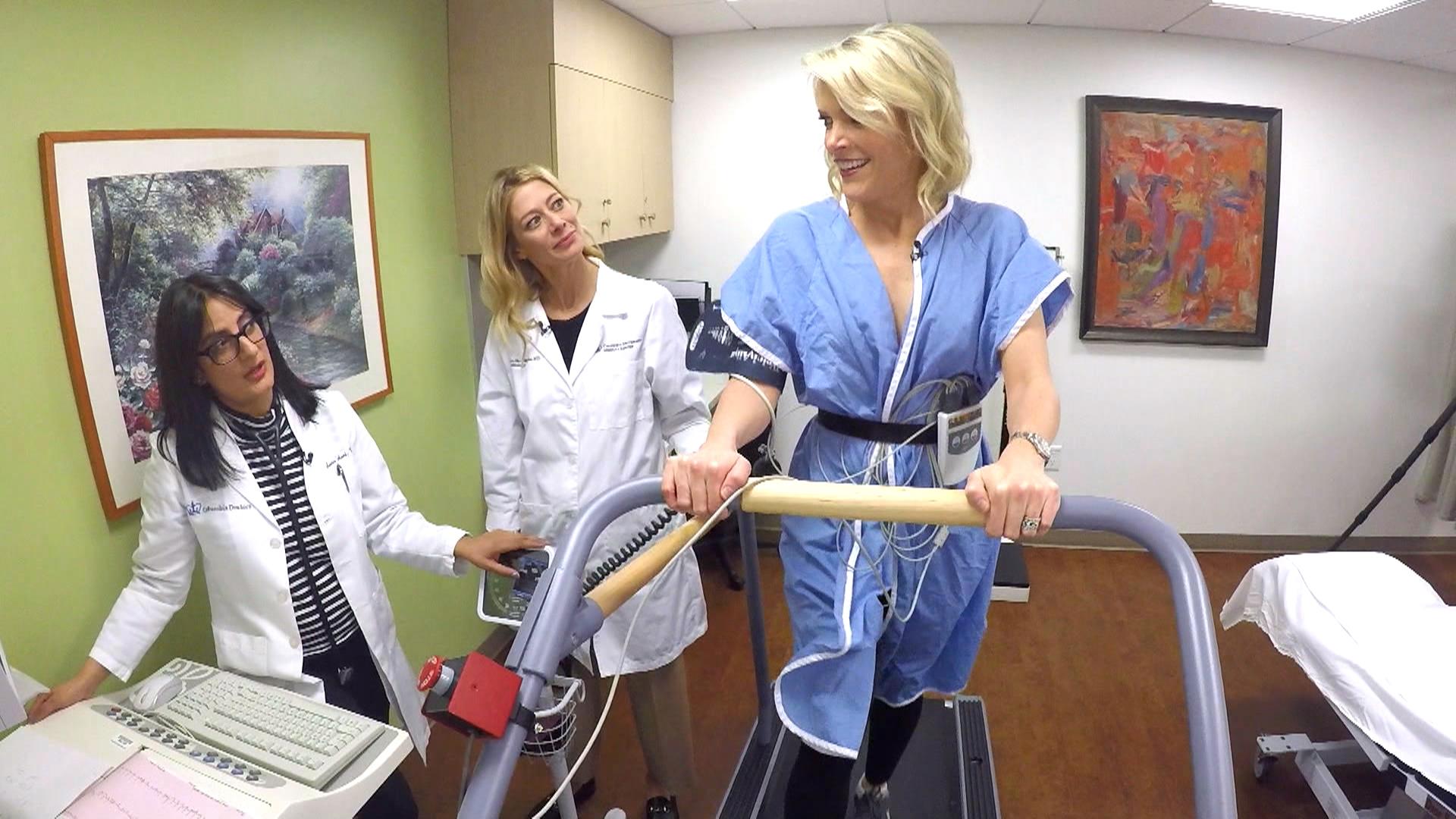
When Is An Echo Stress Test Required?
Usually, this test is suggested by the doctors if you show symptoms like chest pain spreading towards the shoulders or any discomfort in the chest. Additionally, this test is suggested for effective surgery and to estimate the recovery period to avoid any complications during heart surgery.
To rule out any possibility of coronary artery disease while diagnosing any heart-related disease, echo stress test is always performed on noticing the symptoms mentioned above.
The echo stress test is mainly required because, in most cases of coronary artery disease (CAD), minimal or sometimes no signs of a blockage are seen when the patient is at rest. The only way to bring the symptoms to light is by observing them after putting the heart into physical stress by exercising.
During exercise, body muscles require a more significant blood and oxygen flow than when at rest. To pump more blood towards muscles, the arteries dilate i.e., they expand to pass a greater flow of blood.
However, in case of blockage in arteries or narrowing of arteries, an unequal flow of blood is transmitted to various muscles. For example, muscle receiving blood from healthy arteries will receive more blood pumped by the heart.
On the other hand, muscles receiving blood from narrow arteries will receive less blood. This imbalance will result in a reduced flow of blood to specific muscles as compared to others. Thus during exercise, these muscles will starve for blood and oxygen and result in chest pain.
Therefore, upon observing symptoms like frequent chest pain, the test must be performed in a dedicated echocardiography laboratory.
Preparations Required Before The Test
Preparing for the echo stress test can be a bit more hectic than any other medical test. Some of the preparation steps begin almost 24-48 hours before the test.
Depending on your medical center and doctor, you may get a consent form to fill out along with a pamphlet explaining how the test is going to be and what preparations are required beforehand.
Here are some of the generic preparation steps for the test
- Visit the echocardiography laboratory.
Upon your doctor’s suggestion, visit an echocardiography laboratory and take all of your ongoing medicines with you. Let your healthcare provider know about your health status and all of your current medications.
They will ask you to sign a consent form first to get started. Along with the form, a leaflet explaining the test will be provided. Then depending on your medical history, you will be briefed about the preparations.
- Stop consuming medicines containing caffeine or direct caffeine at least 24 hours before the test.
- If a healthcare provider instructs, stop taking any medicine containing beta-blocker elements 24 hours before the test.
- Do not consume drugs like Sildenafil citrate (Viagra), tadalafil (Cialis), and vardenafil (Levitra) one day before the test, as they can alter the test results.
- Do not eat or drink anything 3 hours before your test.
- Preferably wear loose and comfortable clothes as it will be easier to exercise. Also, consider wearing running shoes if possible.
Your doctor knows your health condition better than anyone else. Hence take the above points as generalized statements for everyone. Your doctor may give you some special instructions depending on your health status and ongoing medications, if any.
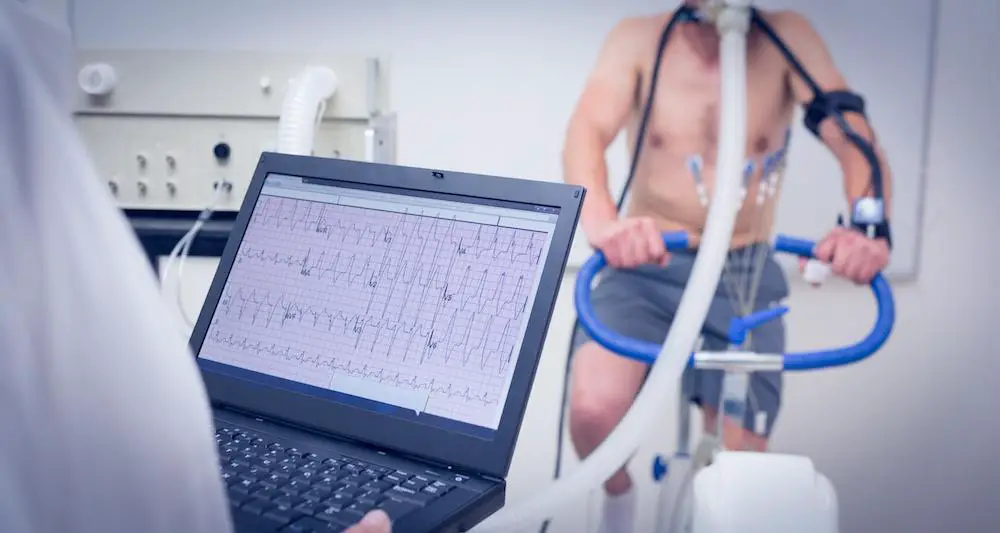
How Does The Test Work?
The echo stress test takes about 45-60 minutes and is done at an echocardiography center. The test consists of two stages: when you are at rest and exercise. However, your heart parameters will be constantly monitored throughout the test.
Heart At Rest
First, the technician or healthcare provider will ask you to lie down on your back on the examination bed. Then ten sticky patches will be placed on your chest; these patches are the electrodes which then will be connected to an ECG monitor to track heart activities.
Then you will be asked to turn on the left side and will monitor your heart’s electrical activities. They will note down the heart rate and will check the rhythm and regularity of heartbeats. Similar readings will be taken while you stand, sit and lie down.
A blood pressure cuff will be placed around your arm. It will be inflated to measure your blood pressure when the heart is at rest. The technician will then prepare for an ultrasound scan. They will apply a transparent gel on your chest evenly.
An instrument called a transducer will be used to perform an ultrasound scan. This transducer will be moved around your chest where the gel is applied. The transducer will emit ultrasound waves and will form images of your heart movement and internal structures like arteries.
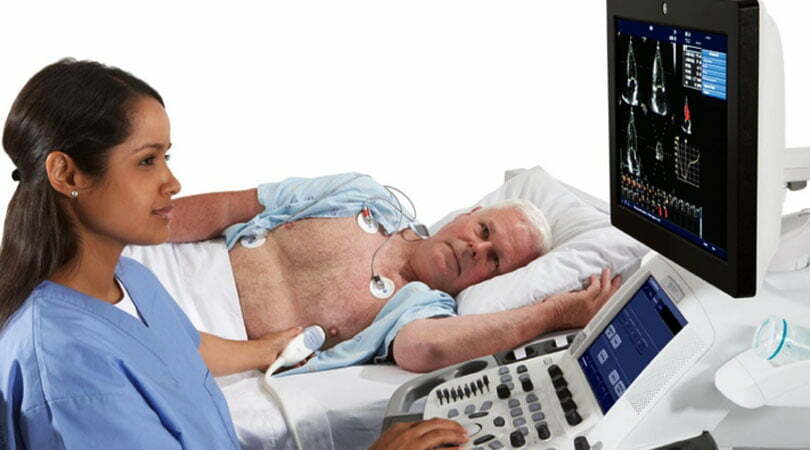
Heart Under Physical Stress
The next step is to put your heart under stress and monitor the parameters. You will be asked to exercise on a treadmill or a stationary bicycle. Every 3 minutes the intensity of the exercise will be made more challenging. The speed and the elevation will be slightly increased to a limit feasible to you.
The exercise period will be somewhere around 10-12 minutes. However, you can always ask the technician to stop if you start feeling dizzy. A physician will be present at the echocardiogram center and will take care of you in case you feel too weak during exercise.
At the end of the exercise, you will be asked how tired you are on a scale of 1-10. Be transparent and honest about your condition, as it affects the end result of the echo stress test.
Once you are instructed to stop exercising, immediately get on the examination bed before your heartbeat begins to slow down. Again lie down on the left side like before and another ultrasound scan will be taken to monitor your heart activities when put under stress.
Then you will be allowed to rest down and relax. Once your heartbeat begins to fall back, your ECG and blood pressure will be continuously monitored until it gets back to normal. By doing so, the technician will be able to spot any irregularities and abnormalities, if present.

What Will The Patient Experience During The Test?
As a patient, a number of electrode patches from ECG will be attached to your body. They can be placed on your chest as well as on your arm and legs to monitor the heart’s electrical activity and blood flow to muscles.
Then to measure your blood pressure, a blood pressure cuff will be wrapped around your one arm. It will be inflated several times during the test to measure the blood pressure. The patient may experience slight discomfort due to electrodes and cuffs but eventually, the patient will feel normal.
During exercise, you may feel dizziness or nausea if subjected to intense exercise. Few people may feel chest discomfort or shortness of breath. In that case, such conditions should be immediately notified to the doctor.
Results Of The Echo Stress Test
Once the test is done, the technician will study and compare the readings, images, and data collected to generate a comprehensive report of the test. However, you will get a preliminary result of the test within 10-15 minutes after completion of the test.
The official comprehensive result may take several days to prepare. The initial report can be helpful in determining if any immediate action is required or not. Whereas, the detailed report will help doctors to jump to more reliable conclusions.
The echo stress test results will indicate either of the two conditions:
1. Normal Results
The expected results will indicate that your heart is in good health and it responds to increased stress by pumping blood harder towards the muscles. Also, as the results are normal, your arteries are expanding enough to allow increased blood flow through the arteries.
Thus, it rules out coronary artery disease i.e. narrowing of blood vessels. It also means that your heart is free from any other heart diseases.
If the results are normal, the doctor will continue the ongoing treatment for the patients who are undergoing some kind of heart-related treatment. Otherwise, doctors would either have to change the treatment or suggest additional precautions.
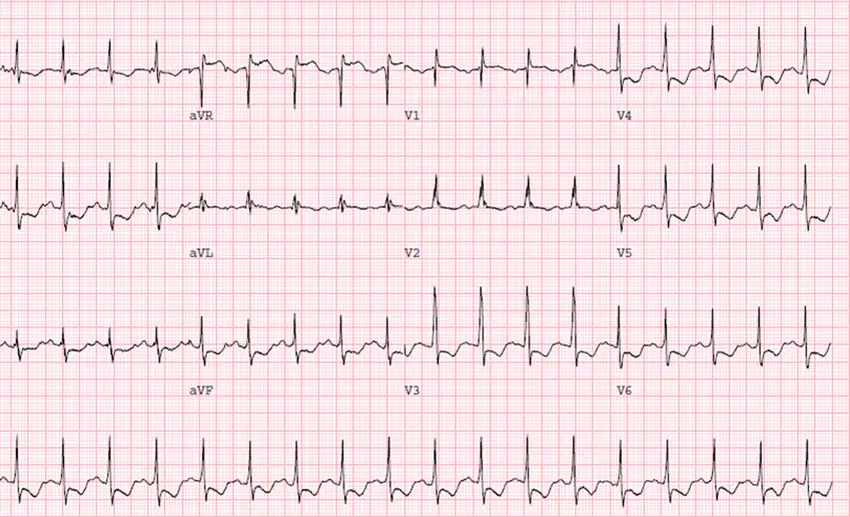
2. Abnormal Results
If the results are abnormal, then it might be because of the following reasons:
- Narrowing of Blood vessels
- Blockage in the blood vessels due to coronary artery disease
- Scarring of heart muscles due to heart attack
If the results are abnormal, doctors may suggest another test, such as cardiac catheterization. as a next step
Otherwise, further treatment will include angioplasty, bypass surgery, stent placement, Coronary angiography, or changes in current heart treatment. The doctor will explain the final results to you to help you decide further actions.
What Are The Risks Linked To The Echo Stress Test?
The risk factor associated with this test is very low and complications are quite rare. It is a noninvasive test and there are no reasons to worry as it includes an ultrasound scan which is considered to be safe.
A person suffering from heart disease may feel chest discomfort or an abnormal heartbeat. But the physicians and other doctors will be supervising the test all the time to take care of any complications.
A patient might suffer from a heart attack in a sporadic case. This may occur if the patient is already suffering from heart disease and is already at a critical stage.
Now that we have seen almost all aspects of the test, here are the few key points you should keep in mind before going for an echo stress test.
Key Points To Remember Before Going For Echo Stress Test
- Bring the medicines or prescription of all the medicines you are currently taking.
- Do not do any kind of exercise on the day of the test.
- Do not eat or drink anything 4 hours prior to the test, few sips of water are permissible.
- Do not drink alcohol or smoke 24 hours before the test as it will affect the results of the test.
- Wear loose and comfortable clothes.
- The test usually will last for 1 to 1 ½ hours to complete.
As the echo stress test is unlike most tests and requires special precautions; most people tend to have certain doubts about the test. If you too have certain doubts about the test, then you are not alone. Here’s a FAQ that will answer most of your questions.
FAQ | Echo Stress Test
- How long does the echo stress test take to complete?
Ans: The echo stress test takes around 1-1½ hours to complete. It includes the pre-test preparations and ultrasound tests.
- How reliable is the echo stress test?
Ans: The echo stress test is performed to diagnose a wide range of diseases and it is not specific to one type of disease. Therefore considering this fact and the quality of instruments used, in 90% of cases, the test can effectively diagnose heart diseases.
- How long does it take to get my results on the test?
Ans: The initial result can be made after a few minutes of the test based on observations. The complete result may take 2-3 days to be prepared.


